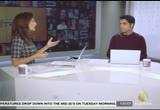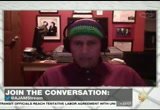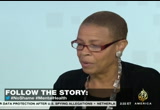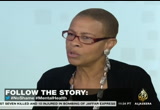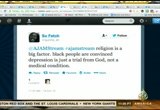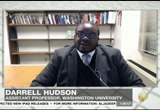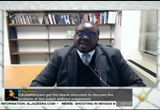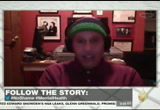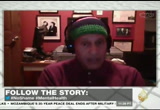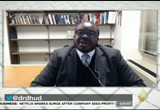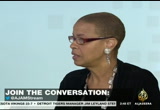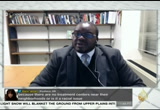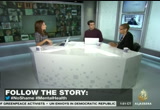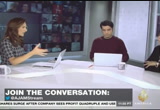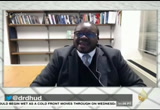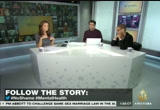tv The Stream Al Jazeera October 22, 2013 2:30am-3:00am EDT
2:42 am
al jazeera america - a new voice in american journalism - >> introduces america tonight. >> in egypt, police fired teargas at supporters of the ... >> a fresh take on the stories that connect to you. [[voiceover]] they risk never returning to the united states. >> grounded. >> real. >> unconventional. [[voiceover]] we spent time with some members of the gangster disciples. >> an escape from the expected. >> i'm a cancer survivor. not only cancer, but brain cancer. america tonight 9 eastern on al jazeera america (vo) al jazeera america we understand that every news story begins and ends with people. >> the efforts are focused on rescuing stranded residents. (vo) we pursue that story beyond the headline, past the spokesperson, to the streets. >> thousands of riot police deployed across the capitol. (vo) we put all of our global resources behind every story. >> it is a scene of utter devastation.
2:43 am
(vo) and follow it no matter where it leads, all the way to you. al jazeera america. take a new look at news. ♪ we're back. we're discussing why dealing with mental illness is different in the black community than others. there is a treatment where your mental state is actually making you sick. and that is more common amongs african-americans. why is that? >> there is some connections between physical and mental health. part of it could be people are -- there's some amount of literature that perhaps there's a difference in symptomology, particularly the symptoms that african-americans feel or are
2:44 am
willing to admit compared to whites. so there has been some work to look at the differences there. so the fiscal nature of it so part of it, but there's also some links, a growing body of literature that shows a link between mental health and physical health. a good example is depression and diabetes. we're not quite sure what the connection is. is people are diagnosed with the disease, and then people are depressed or if there's a physiological pathway between that disease and physical depression. so there are a number of reasons why we can see that connection. >> doctor you have done some significant research on fetal alcohol syndrome in the african american community. talk a little bit about that. >> it turns out that fetal
2:45 am
alcohol exposure is the leading cause -- or attention deficit hyperactivity, learning disorders, and mild intellectual disability in speech and language problems. those are the four most common problems that children have, and as a result when you -- so i treat black people, and they come in, and i say what brings you? and they say i'm bipolar, i'm depressed, and i'm schizophrenic. and i say really? at which point i ask them if they have special education in the school and do they have a bad temper? and what you find if you look at special education populations a good 50% of the black children in special ed have fetal alcohol brain damage. if you look in corrections populations in detention centers
2:46 am
you'll find a good 50% there. if you look in a mental health population, a third of the patients, in or outpatient have fetal alcohol brain damage and if you think about poor black communities, the main business that is thriving are liquor stores. and some young black women are drinking before they find out they have pregnant, and then done. >> give a listen to this video. >> i think that the stigma of mental illness is different for african-americans because we are held to stereo types like the strong black women that are just impossible to adhere to, and there's also this perception that therapy is for white people. that black people who have mental disorders are being
2:47 am
dramatic, or it's viewed as a weakness or a failure, and this just impedes those who need to get mental health care. >> talk about the stereotypes that exist within the african community. the strong black woman and proud masculine man. >> absolutely. >> and how do these play particularly with the youth. >> first of all, therapy is the gift that keeps on giving. that's what i just wanted to say at the outset, but i was thinking about something that karl had said about the number of black folks in special ed, but i think it also has to do with the amount of violence and trauma in our communities. you see somebody cut down right in front of you, and then you get up and go to school or work as if you didn't just witness that. and nobody is getting any help. i just thought about that -- but
2:48 am
i don't think i really answered your question. >> no, please go ahead. i know you said this image that people have to hold up in the african american community of being the strong black woman or man, it seems it adds another layer of shame. >> it does. as a young african american -- any man growing up, you have to be strong. you cannot show emotion. you can't go run and tell mommy this, so eventually you just stop talking about then that comes out in an explosion. one kid got up after watching the public service spots, and he said i stabbed someone seven times, and then he said and he at. >> oh. >> so it's when you adopt have anywhere to go, you'll take it out on anyone. and it's why we really need to get ours help.
2:49 am
>> professor hudson, because the obvious impact, there's a huge economic impact here. talk about what you have seen in regard to that. >> sure. so here in st. louis there's an incredible amount of economic costs associated with mental disorders. generally african-americans, cost about $96 million in hospital visits to treat for mental disorders, compared to about -- almost $300 million for whites. so it's lower, but african-americans only make up about 15% of the st. louis region, so they can costing almost half of what white costs in terms of mental health treatment. but those numbers are diluted, because we're not talking into account, loss of productivity, days off work. days that you are not feeling well and productive. there is a somebody of estimates
2:50 am
that indicate on average in st. louis, the average person spends about 4.5 days not feeling quite well, and so those -- those impacts are incredibly difficult to encompass. we have data within mental health, but we know that the cost is much more than just the treatment that we see in hospitalizations. >> daryle, i want to mention, the community is talk about the systemic inequalities and racism and give a listen to jewels. >> from my own experience as well as a services provider in the mental health community, i
2:51 am
found that many african-americans are reticent to speaking mental health services because many providers are of anglo or middle class background and may not explore issues that are contributing factors that go into the degradation of the african american community. >> what is your response? >> she is absolutely right. when one goes into corporate america, especially if you are a big black man who has a booming voice. there was a piece in the "wall street journal" about a black man lowering their voices so they don't seem as intimidating.
2:52 am
and if you don't get that out, you can have more problems at home. they have such influence over the community. >> dr. bell i want to give you a chance to jump in on this. >> well, let's be clear. the majority of black people in america are getting psychiatric and mental health treatment in special education, corrections and child protective services. we need to be real clear about that. black people are getting mental health care through the public systems of again, corrections, child protective services and special education. >> and that indicates it would be a crisis level at most of those points? >> i'm not sure it's at a crisis level.
2:53 am
i think daryle mentioned access. black people don't have access. poor black people don't have access to a black psychiatrist or any psychiatrist. so they wind up being put in special education, corrections, or special services. >> how can decades of this stigma be undone to improve this care. our panel has some
2:55 am
2:56 am
ministers who say in can't of the congregation, there are more that are establishing counseling rooms in the church, and mental health professionals donating their services, so i see a growing trend. and then on the other hand there are those who will say that it's a sign of weakness to go to a therapist, because you take so that's a great place to start and we head to to do more. >> daryle, talk about the role of culturally competent care in the mental health field. >> sure, provider bias is a may major issue. many people think if you are a medical professional, you lose the stereo types that you are exposed to. but all of the things are
2:57 am
embedded so deeply in our society, that oftentimes when people go through training, do four years of medical school or complete a master's et cetera, et cetera, they don't believe those biases at the door. so that could be where there's a difference in diagnosis. african american men are overdiagnosed as schizophrenics, and unless diagnosed as depressed. >> our community seems to be agreeing with you . . .
2:58 am
so dr. bell we keep seeing this mistrust of, quote unquote, white america or the medical this? >> i think the answer to the healthcare crisis in america in general is prevention. we were part of a 2009 prevention report from the institute of medicine, and if you look at how much of it has been reduced there is a lot of prevention. there's prevention for depression, possible prevention for schizophrenia, prevention for fetal alcohol syndrome, so there are a lot of ways
2:59 am
to do prevention prevention. all of the other industrialized countries are spending prevention. >> i want to give you the final thought. >> we look at people's masks every day, and if you have the courage to share your story. it helps people understand that they are not alone. you look at someone's face and they are smiling, you think everything is okay. but you have no idea what that person's journey has been. >> thanks so all of our guests tonight. we'll see you online. ♪
3:00 am
hundreds of firefighters flown in from around australia to battle bush fires now threatening sydney. ♪ ♪ hello from me david foster you are watching al jazerra live from doug doha. amnesty internationals says the u.s. should identifies war crimes over drone strikes. protesters and police clash in rio over the sale of brazil's biggest offshore oil field. >> reporter: and i will be reported on the poachers who haveec
131 Views
1 Favorite
Uploaded by TV Archive on

 Live Music Archive
Live Music Archive Librivox Free Audio
Librivox Free Audio Metropolitan Museum
Metropolitan Museum Cleveland Museum of Art
Cleveland Museum of Art Internet Arcade
Internet Arcade Console Living Room
Console Living Room Books to Borrow
Books to Borrow Open Library
Open Library TV News
TV News Understanding 9/11
Understanding 9/11

